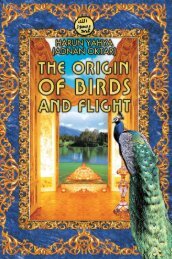Islam, the Qur'an and the Arabic Literature
Islam, the Qur'an and the Arabic Literature
Islam, the Qur'an and the Arabic Literature
You also want an ePaper? Increase the reach of your titles
YUMPU automatically turns print PDFs into web optimized ePapers that Google loves.
contemporaries. It has also served as a means for preserving <strong>the</strong> cultural <strong>and</strong><br />
religious heritage of <strong>Arabic</strong>-speaking <strong>and</strong> Muslim peoples. In this sense, <strong>the</strong><br />
language has been extremely useful to <strong>the</strong> religion. However, in its role as <strong>the</strong><br />
language of <strong>the</strong> Qur’an, <strong>Arabic</strong> has benefited enormously. There is a clear<br />
legitimacy to <strong>the</strong> claim that <strong>Islam</strong> <strong>and</strong> <strong>the</strong> Qur’an have helped to preserve<br />
<strong>Arabic</strong> from decay <strong>and</strong> deterioration, for it was mainly due to <strong>the</strong> need to<br />
preserve <strong>the</strong> accuracy <strong>and</strong> pronunciation of <strong>the</strong> verses of <strong>the</strong> Qur’an that<br />
efforts were instigated towards refining <strong>the</strong> <strong>Arabic</strong> alphabet. Subsequently, <strong>the</strong><br />
Qur’an was instrumental in <strong>the</strong> codification of <strong>Arabic</strong> grammar in <strong>the</strong> second<br />
<strong>the</strong> third <strong>Islam</strong>ic centuries. Fur<strong>the</strong>rmore, <strong>the</strong> need for Muslims, whe<strong>the</strong>r native<br />
or non-native speakers of <strong>Arabic</strong>, to memorize <strong>and</strong> recite verses from <strong>the</strong><br />
Qur’an in <strong>the</strong>ir daily worship has helped to keep <strong>the</strong> <strong>Arabic</strong> language alive. It<br />
was due to its association with <strong>Islam</strong> <strong>and</strong> <strong>the</strong> Qur’an that <strong>Arabic</strong> gained a<br />
good deal of prestige as <strong>the</strong> language of a young faith, a faith that was<br />
gaining more <strong>and</strong> more followers with each new day. The interest in <strong>the</strong> new<br />
faith this brought with it interest in <strong>the</strong> language of that faith. It was under <strong>the</strong><br />
banner of <strong>Islam</strong> that <strong>Arabic</strong> spread beyond <strong>the</strong> borders of <strong>the</strong> Arabian<br />
Peninsula to far-off areas in Europe, south-east Asia, <strong>and</strong> Africa.<br />
From literary, structural, <strong>and</strong> stylistic points of view, <strong>the</strong> Qur’an added<br />
immeasurably to <strong>the</strong> beauty of <strong>the</strong> language, introducing new styles, forms of<br />
expression, figures of speech, <strong>and</strong> structures. The Qur’an also enriched <strong>and</strong><br />
exp<strong>and</strong>ed <strong>the</strong> vocabulary of <strong>the</strong> <strong>Arabic</strong> language by employing hundreds of<br />
words of foreign origin, thus demonstrating <strong>the</strong> legitimacy of lexical borrowing<br />
as a linguistic device. The Qur’an similarly presented Arab scholars with a<br />
higher criterion of literary excellence <strong>and</strong> set new <strong>and</strong> more rigid st<strong>and</strong>ards for<br />
literary composition for subsequent generations of Arab scholars. The model<br />
that <strong>the</strong> Qur’an provided, while remaining inimitable, has sharpened <strong>the</strong><br />
literary skill <strong>and</strong> kindled <strong>the</strong> talent of generations of scholars in <strong>the</strong>ir attempts<br />
to emulate <strong>the</strong> style <strong>and</strong> literary excellence of <strong>the</strong> Qur’an, <strong>the</strong> first book in <strong>the</strong><br />
<strong>Arabic</strong> language. Interest in <strong>the</strong> Qur’an, its language, <strong>and</strong> its exegesis gave<br />
rise to a number of related disciplines, which include philological, religious,<br />
<strong>and</strong> linguistic studies. There is no doubt that <strong>the</strong> <strong>Arabic</strong> language was<br />
extremely useful as a medium for <strong>the</strong> revelation of <strong>the</strong> Holy Qur’an <strong>and</strong> for<br />
communicating God’s final message to <strong>the</strong> pre-<strong>Islam</strong>ic Arabs of <strong>the</strong> seventh<br />
century. It is, however, <strong>the</strong> conclusion of this paper that <strong>the</strong> <strong>Arabic</strong> language<br />
underwent drastic changes in its structure, content, <strong>and</strong> status due to its<br />
association with <strong>Islam</strong> <strong>and</strong> <strong>the</strong> Qur’an, changes that <strong>the</strong> language would not<br />
have undergone had it not been for <strong>the</strong> new role it acquired in its bond with<br />
<strong>Islam</strong> <strong>and</strong> <strong>the</strong> Qur’an.<br />
Footnotes:<br />
[1] See, for this view, ’Abbas Hasan, Al-Lugha wa-l-nahw bayn al-qadim wa-lhadith,<br />
Cairo, 1966, <strong>and</strong> IbrahimAnis, Min asrar al-lugha, Cairo, 1970.<br />
[2] Anwar Cheyne, The <strong>Arabic</strong> language: its role in history, Minnesota, 1969,<br />
ch. 4,pp. 53 ff.<br />
[3] Ibid.<br />
16




